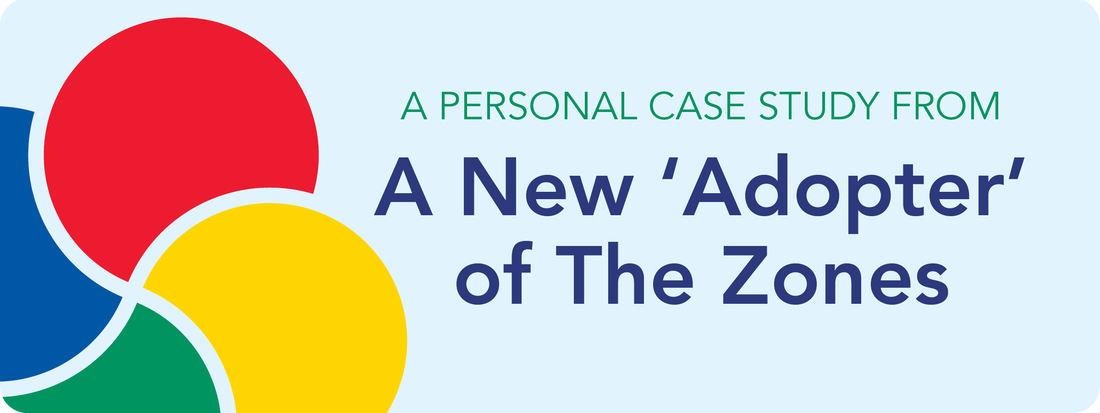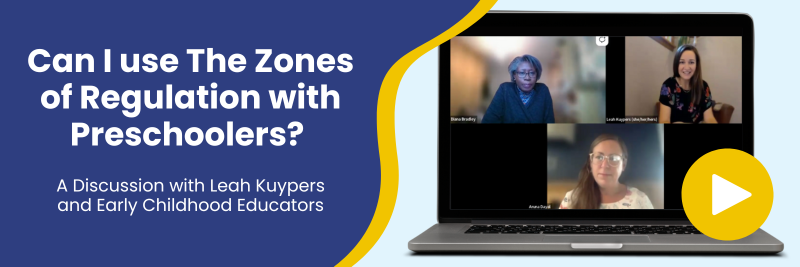How do we go about making a change in our school or community? According to the Diffusion of Innovation Theory developed by E.M. Rogers in 1962, the adoption of a new idea, behavior or practice does not happen simultaneously within a social system such as a classroom or school community; rather it is a process whereby some people are more apt to adopt the innovation than others; and, over time, more members eventually make the change. Simply stated, a new idea or practice won’t be widely adopted until a majority within a group agree that it’s useful and are willing to change their behavior by trying something new.
Given the number of new ideas being presented to teachers all the time, I believe the decision to try something new can be even more challenging in school communities because teachers want to know that whatever change they’re being asked to make is worth their time and effort.
When Leah Kuypers created The Zones of Regulation to use with the students she taught as an Occupational Therapist, she had no way of knowing that The Zones would expand to become a curriculum that would be ‘adopted’ in hundreds of districts across the USA and in dozens of nations. The Zones has grown because it has helped learners of all ages understand the full range of their feelings as well as how to use tools and strategies to support their wellbeing and learning. If you’ve been using The Zones framework at your school, perhaps the Diffusion of Innovation theory resonates with the way The Zones has evolved in your learning community.
By now you might be wondering my reasons for sharing this. I recently joined The Zones team and as I’ve become familiar with the content by talking with Leah and my new colleagues, meeting with educators and by studying The Zones lessons. I want to make the case to you that The Zones can be a useful tool for us as adults, both at work as well as in our personal lives. Over the holidays, I had the chance to regulate my emotions many times during various interactions with family and friends. It was a new feeling to reflect on how my personal regulation tools worked for me. In just a few days, I was gaining a new understanding of my own regulation toolbox and how to use it.
Those interactions got me to think about how as a former classroom teacher, I often encountered the well-known teacher mantra: you understand something more deeply after you’ve taught it. Of course, that’s the essence of experiential learning practices that includes everything from hands-on science experiments to writer’s workshop. We simply best learn by doing – by practicing what we teach.
That’s why, as we begin a new year, I invite you to adopt the practice of integrating the Zones into your own lives by taking a moment each day to ask yourself questions like:
- what Zone am I in?
- what am I feeling?
- what can I do to regulate my emotions at a specific moment during the day?
Why not share your Zone as a think-aloud strategy to model for your students? My hope is for this form of care – the type of empathy that you as teachers naturally extend towards your students – can also be extended to yourselves. I believe that you will not only feel better by doing so but your students will benefit from having a more self-aware adult in their lives. In fact, I don’t know anyone who wouldn’t benefit from the gift of self-reflection. If you’re not already doing so, please consider adopting this wellness practice. It only takes a moment and the potential benefits are huge.
If you entertain my invitation, it’s important to remember that all Zones are okay. And to answer that question, “how do we go about making a change in our school or community?”, the answer is, it starts with you! Be the change you want to see.
Wishing you a happy, healthy and successful new year.
Stephen Perepeluk
Head of Strategic Initiatives
For more on diffusion of innovation theory see “On the Diffusion of Innovations: How New Ideas Spread” by Leif Singer.





